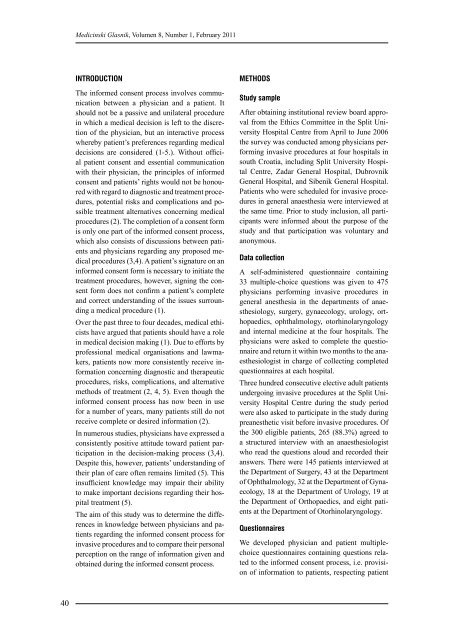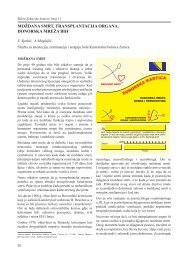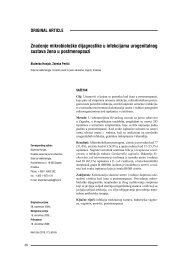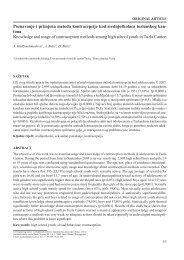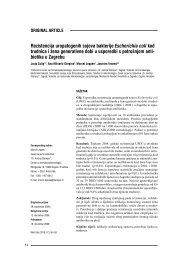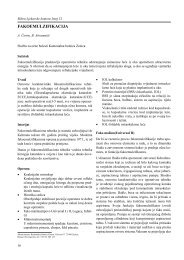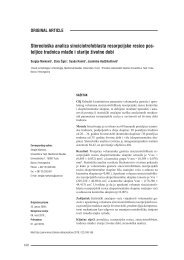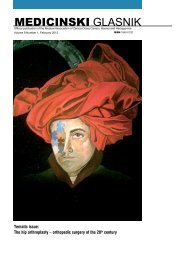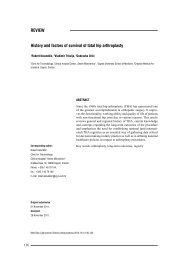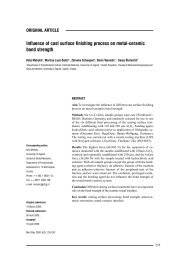MEDICINSKI GLASNIK - Aktuelno Ljekarska komora ZE - DO kantona
MEDICINSKI GLASNIK - Aktuelno Ljekarska komora ZE - DO kantona
MEDICINSKI GLASNIK - Aktuelno Ljekarska komora ZE - DO kantona
Create successful ePaper yourself
Turn your PDF publications into a flip-book with our unique Google optimized e-Paper software.
40<br />
Medicinski Glasnik, Volumen 8, Number 1, February 2011<br />
INTRODUCTION<br />
The informed consent process involves communication<br />
between a physician and a patient. It<br />
should not be a passive and unilateral procedure<br />
in which a medical decision is left to the discretion<br />
of the physician, but an interactive process<br />
whereby patient’s preferences regarding medical<br />
decisions are considered (1-5.). Without official<br />
patient consent and essential communication<br />
with their physician, the principles of informed<br />
consent and patients’ rights would not be honoured<br />
with regard to diagnostic and treatment procedures,<br />
potential risks and complications and possible<br />
treatment alternatives concerning medical<br />
procedures (2). The completion of a consent form<br />
is only one part of the informed consent process,<br />
which also consists of discussions between patients<br />
and physicians regarding any proposed medical<br />
procedures (3,4). A patient’s signature on an<br />
informed consent form is necessary to initiate the<br />
treatment procedures, however, signing the consent<br />
form does not confirm a patient’s complete<br />
and correct understanding of the issues surrounding<br />
a medical procedure (1).<br />
Over the past three to four decades, medical ethicists<br />
have argued that patients should have a role<br />
in medical decision making (1). Due to efforts by<br />
professional medical organisations and lawmakers,<br />
patients now more consistently receive information<br />
concerning diagnostic and therapeutic<br />
procedures, risks, complications, and alternative<br />
methods of treatment (2, 4, 5). Even though the<br />
informed consent process has now been in use<br />
for a number of years, many patients still do not<br />
receive complete or desired information (2).<br />
In numerous studies, physicians have expressed a<br />
consistently positive attitude toward patient participation<br />
in the decision-making process (3,4).<br />
Despite this, however, patients’ understanding of<br />
their plan of care often remains limited (5). This<br />
insufficient knowledge may impair their ability<br />
to make important decisions regarding their hospital<br />
treatment (5).<br />
The aim of this study was to determine the differences<br />
in knowledge between physicians and patients<br />
regarding the informed consent process for<br />
invasive procedures and to compare their personal<br />
perception on the range of information given and<br />
obtained during the informed consent process.<br />
METHODS<br />
Study sample<br />
After obtaining institutional review board approval<br />
from the Ethics Committee in the Split University<br />
Hospital Centre from April to June 2006<br />
the survey was conducted among physicians performing<br />
invasive procedures at four hospitals in<br />
south Croatia, including Split University Hospital<br />
Centre, Zadar General Hospital, Dubrovnik<br />
General Hospital, and Sibenik General Hospital.<br />
Patients who were scheduled for invasive procedures<br />
in general anaesthesia were interviewed at<br />
the same time. Prior to study inclusion, all participants<br />
were informed about the purpose of the<br />
study and that participation was voluntary and<br />
anonymous.<br />
Data collection<br />
A self-administered questionnaire containing<br />
33 multiple-choice questions was given to 475<br />
physicians performing invasive procedures in<br />
general anesthesia in the departments of anaesthesiology,<br />
surgery, gynaecology, urology, orthopaedics,<br />
ophthalmology, otorhinolaryngology<br />
and internal medicine at the four hospitals. The<br />
physicians were asked to complete the questionnaire<br />
and return it within two months to the anaesthesiologist<br />
in charge of collecting completed<br />
questionnaires at each hospital.<br />
Three hundred consecutive elective adult patients<br />
undergoing invasive procedures at the Split University<br />
Hospital Centre during the study period<br />
were also asked to participate in the study during<br />
preanesthetic visit before invasive procedures. Of<br />
the 300 eligible patients, 265 (88.3%) agreed to<br />
a structured interview with an anaesthesiologist<br />
who read the questions aloud and recorded their<br />
answers. There were 145 patients interviewed at<br />
the Department of Surgery, 43 at the Department<br />
of Ophthalmology, 32 at the Department of Gynaecology,<br />
18 at the Department of Urology, 19 at<br />
the Department of Orthopaedics, and eight patients<br />
at the Department of Otorhinolaryngology.<br />
Questionnaires<br />
We developed physician and patient multiplechoice<br />
questionnaires containing questions related<br />
to the informed consent process, i.e. provision<br />
of information to patients, respecting patient


